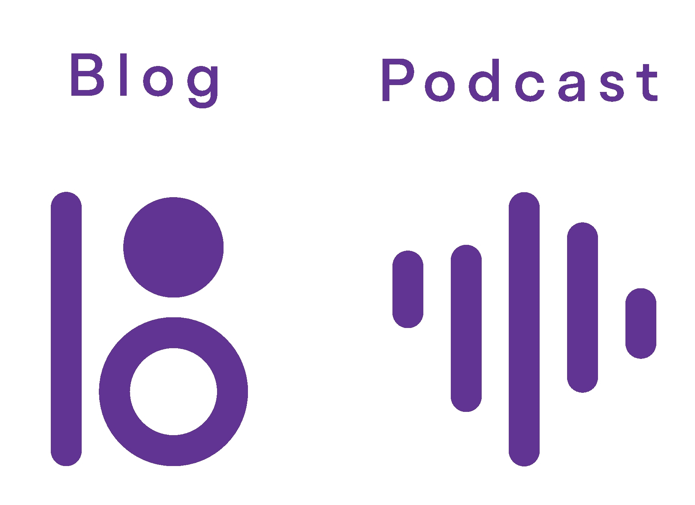Giving Students Choice and Agency in Assignments
By Heather Leslie and Heather Herrera

Over the summer, Dr. Heather Herrera (Instructor in SOLES) and Dr. Heather Leslie (Instructional Designer in the LDC) teamed up to design the third course in the dissertation sequence (Doctoral Seminar III). Dr. Herrera came up with a really creative assignment for this course that gave students choice, agency, and the opportunity to build community with their peers during their dissertation process. This is something we both noted we would have greatly benefited from back when we were working on our dissertations where it can feel pretty isolating at times. This post describes the assignment, results, and our reflections.
The Analysis Diaries: Blog or Podcast Assignment
The name of the assignment is The Analysis Diaries: Blog or Podcast. In this assignment, students interview a peer about their research process. In the interview, students are instructed to discuss how they approach their data analysis. They are encouraged to make connections between what their peer reports and what they have read that week in the course. Students are to prepare several questions in advance of the interview to stimulate the discussion. And finally, they need to summarize the conversation. Students can choose to record the interview as a podcast episode or write up a summary of the interview in a blog post. We provide some guidance to students on the format they choose such as tips on using Zoom to record a podcast and an example of a blog post that students may find inspiring. The blog tool in Blackboard was used in this assignment where students can either post their written blog or a link to their podcast recording. After students post to the blog, they are instructed to review 2 works (blog or podcast) and provide comments to 2 of their peers.
Results
Dr. Herrera reported that she was “amazed by the quality of work the students submitted.” We were curious to find out what students thought of the assignment so we invited them to give us their feedback over email and 3 students responded. We received their permission to publish their feedback in a blog post.
Questions we asked were:
- If they enjoyed the assignment
- How much they think it contributed to their learning
- What they think about having a choice between doing a written blog post or a recorded podcast interview
- If they think the assignment helped build community with peers
- If they have any suggestions for improving this assignment for future students
Here are the answers students provided to our questions.
- Did you enjoy the assignment?
Student A
This was an interesting way for the professor to get us to think about what we need to do with our data. By now we are quite used to writing out justifications for our decisions and/or writing about our methodology, but it is quite another thing to have to speak to it and to respond to clarifying questions in the moment! I admit to being a little anxiety-ridden about the recorded nature of this assignment in the beginning, but once I started talking with my classmate, it started to flow. It was a nice break from writing and yet it still was quite helpful in thinking through what I needed. For this reason, I thought it was an excellent assignment.
Student B
Working on the podcast assignment was a great experience and I really enjoyed it. The reason is because it contributed to the learning process by having me formulate my understanding to someone else. With discussion boards you are positioned to answer someone's post and not really bring more to it. In fact sometimes a conversation has the opportunity to continue in a discussion post but it doesn’t as classmates have moved on to another assignment.
Student C
I enjoyed it very much because it was more of a conversation, and it felt like I was back in a traditional learning environment (classroom).
2. How much do you think this assignment contributed to your learning?
Student A
I knew I needed to tighten up the alignment between tenets of my theoretical framework and how I would approach the collection and analysis of my data, but I hadn't really taken the time to do the tough thinking until I needed to prepare for this assignment. I knew in advance the big questions I would be asked by my classmate in our podcast and so preparing to answer those was helpful. It wasn't until I reflected on our conversation after the fact that I realized the way [my peer] was answering my questions and the connections she made to our readings was really what pushed my thinking and probably provided the most benefit. It is in conversation with others that things outside of our own thought process begin to make sense!
Student B
“[The assignment] contributed to the learning process by having me formulate my understanding to someone else.”
Student C
I did need to be prepared before I began the podcast which in a way made it feel like a socratic seminar, or flipped classroom model, so in that regard, it helped prepare me. Once I was talking with my peer I gained insight into her research and into the way she interpreted the texts we were assigned to read, so that contributed as well.
3. What did you think about having a choice between doing a written blog post or a recorded podcast interview?
Student A
Anytime we are given choices about how we learn or how we represent our learning- it provides an added incentive to produce high-quality work. If the professor thinks so highly of us to allow the choice, I take it as given that we should respond with something meaningful.
Student C
An interview feels more interactive and human and takes me back to when I was in the classroom. I like blog posts as well, but the human interaction and ideas that can be attained when we are engaged might not be as genuine in a blog post.
4. Do you think this assignment helped build community with your peers?
Student A
[My peer] and I have been on this journey for a while now and we work well together, however we are studying very different aspects of education. Hearing her think through her topic and framing always gives me ideas and pushes me into new directions in my own thinking.
Student B
I was fortunate to have a community with my peers already but for this assignment I did work with someone who I rarely worked with. It did allow me to work with strengths. In fact if you watch our podcast, you can tell which literature we connected with.
5. Do you have any suggestions for improving this assignment for future students?
Student A
I think Dr. Herrera laid out a really nice model for us to follow. I can see how a discussion amongst more than 2 people might produce similar results and enrich the experience for everyone involved.
Student B
I think podcast can grow to be something bigger: Instead of discussion post, maybe professors can meet with class (those who are able) and they can join in a discussion like a podcast. Those who do this can share it later with rest of the class. Those that were unable to attend, they can still do discussion board.
Reflections
While this is just a small sample of students and isn’t representative of the whole class, we are happy that these students who generously took the time to provide us with feedback seemed to have really enjoyed and learned a lot from this assignment. Their responses also confirm that it is a good practice to give students choice and agency in their learning. Giving students flexibility and freedom to demonstrate their learning in their own way follows Universal Design for Learning guidelines and this helps to facilitate greater student engagement in courses. Likewise, finding ways for students to collaborate with each other through assignments such as interviews or peer reviews can help build class community that fosters engagement, which is especially important to pay attention to in online courses.
Finally, having students explain their thought process to a peer promotes metacognition and engages students in the learning process. This focuses students’ attention on what they are learning as opposed to how they are doing in relation to completing the end product (i.e. submitting an assignment, getting an A, finishing a dissertation, etc.). Having students discuss their thought process in community with peers can tap into their intrinsic motivation for what they are learning which can translate to improved outcomes and achievement. It can also help them develop the thinking and collaborative skills needed to navigate a world that is continuously being disrupted, including by technological advances such as AI. In reflecting on this assignment, Professor Herrera said, “The conversations were so rich and riveting--just like a good podcast. I learned that asking students to have a semi-structured discussion is just as valid an assessment as having them write a long paper--if not even more valid because of the thinking they produced on the fly in response to what their peer was saying.” This kind of authentic assessment can capture rich, holistic information about where students are in their learning process and how they are making meaning of the course content. As we look toward the future, we are excited by the opportunities to experiment with creative approaches to course design that promote student agency, choice, community, conversation, and critical thinking that centers the process of learning.
References
Buzzsprout (2022). How to record a podcast on Zoom (best settings). [YouTube]. Retrieved from https://www.youtube.com/watch?v=M90YTVdW6-A
Mendez, E. (2022, July 19). A reflective critique of imposter syndrome. NASPA. Retrieved from https://www.naspa.org/blog/a-reflective-critique-of-imposter-syndrome
CAST.org (n.d.). The UDL Guidelines. Retrieved from https://udlguidelines.cast.org/

